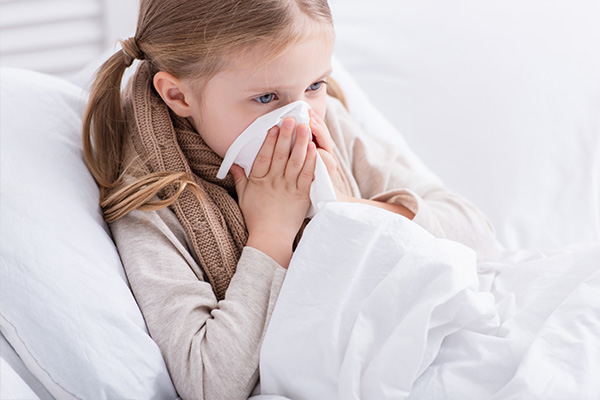In this article:
Babies have no antibodies of their own at birth and have to rely on the antibodies they receive through their mother’s milk to fight off diseases. This borrowed immunity lasts for a while and gradually the child’s own nascent immune system kicks in but not at full strength.

The child’s disease-fighting ability grows with age, but there are several things you can do to give it a much-needed boost.
Difference Between the Immunity of a Child and an Adult
A child’s immune system is still underdeveloped as opposed to that of fully grown adults. Moreover, their skin and gut are not strong and mature enough to protect them from invading germs, unlike that of adults.
With regard to the bloodstream, a child’s ability to create antibodies is much less than that of adults.
At What Age Does a Child’s Immune System Become Fully Developed?
Believe it or not, the immune system is continuously developing and grows in response to challenges. Antibodies are created in response to an illness.
When a child is exposed to a new germ, the body engineers antibodies to counter that particular threat, which are then stored in the lymphatic system to be used the next time the child is exposed to that same illness. This gives a push to the immunity, such that the body is better equipped to fight the second bout of that illness.
Generally, it is said that a child’s immune system becomes fully mature during teenage, but their immunity continues to grow with every subsequent illness or infection.
Is Getting Sick Regularly a Sign of a Healthy Immune System?
Not necessarily. The healthiest of immune systems usually fight off germs without any symptoms developing. It is only when the disease is severe enough to require a big immune response that symptoms may develop, which is recognized as feeling sick.
Thus, getting sick often is not a positive sign, but a warning to take your health more seriously.
The Role of Vaccines in Building a Child’s Immunity

Very important! Vaccines have scientifically been shown to protect children from various serious diseases that can cause lifelong complications or even death. (1)
Vaccinating children against such dangerous illnesses will improve their immune response to them. This means, if and when they become exposed to these diseases, their immune system will be equipped with its own antibodies to avert the health threat.
Science is incredibly strict in deciding which diseases need vaccines to protect people and designing vaccine schedules to assure coverage of the most vulnerable immune systems at the right time.
The vaccine must be established to do more good than harm for anyone who receives it. The vaccines people are currently using are a proven way for parents to protect their children from very serious diseases.
Is There a Maximum Limit to the Number of Vaccines a Child Should Be Given?
No, the immune system handles countless challenges on a daily basis. A vaccine is a known challenge that can protect a child from getting ill from a specific disease.
Best Immunity-Boosting Vitamins for Children
No specific vitamins can boost your child’s immunity on their own. Children absorb vitamins and nutrients best when offered within a well-balanced diet.
Breast Milk: The Only Source of Immunity in Newborns
Yes, babies are born without any antibodies of their own and derive their immunity from the mother’s milk in the early days after birth. Breast milk contains antibodies that are useful in the digestive system of newborns.
Some studies propose that breast milk promotes many healthy aspects of the child’s immune system that offer protection against allergies and inflammatory diseases. (2)
Ways to Keep Your Baby Disease-Free
Parents and caregivers should wash their hands frequently, assure sanitary conditions when preparing food, and protect them from close contact with ill visitors.
Foods That Are Good for Your Child’s Immunity
Add these nutritious foods to your child’s diet to help them stay disease-free:
- Natural foods, such as whole grains, nuts, fruits, and vegetables that are simply prepared
- Animal products that are inspected to be free of disease and assured of freshness
Safety of Immunity-Boosting Supplements for Children
There is no data to support the use of supplements for building your child’s immunity.
Lifestyle Changes to Boost the Immunity of Children

Here are a few things that parents must do to help their child develop stronger immunity:
1. Make them practice proper hand hygiene
Inculcate the habit of washing hands frequently, especially before and after eating and touching their face as well as every time they leave a restroom or come in from outside.
ALSO READ: 9 Good Hygiene Habits Your Kids Should Learn
2. Prioritize good nutrition
Your diet acts as fuel for your body and enables its various life-sustaining functions. The foods you eat supply you the essential nutrients required for building a strong immune system.
Thus, it is very important to feed your child a wholesome diet that consists of vital minerals, vitamins, and amino acids, among other essential nutrients, especially since malnutrition has emerged as the prime cause of immune deficiency all over the world. (3)(4)
3. Make sure they get enough rest
The body works tirelessly round the clock, but it gets to repair and rejuvenate itself during sleep. Not allowing the body a proper resting period will compromise its function and make it more prone to disease.
A well-rested body is more likely to have a stronger immune system. Thus, you need to make sure that your child gets enough sleep every day to ensure a strong body and good immunity.
Regularize your child’s sleep schedule so they sleep on time and wake up on time.
4. Keep them stress-free
Stress leads to the release of cortisol hormone in the body, which inhibits the immune system. A lot of people assume that children are so carefree and innocent that they are incapable of stress, which is patently false.
In fact, children are highly perceptive beings who can pick up on any tension at their home or school, even the stress of their parents. So, it is important for parents and elders to stay mindful of that.
Raise your child in a calm and happy home, communicate with them about things that bother them, and keep them engaged in productive activities to minimize stress in their lives. Stress can hinder their immunity, as well as emotional and behavioral development.
5. Engage them in exercises and outdoor activities
Physical activity helps build your child’s gut microbiota for strong immunity. (5) Include 1 hour of indoor or outdoor playtime/exercise in your child’s daily routine.
Breathing fresh air, moving your body, exploring your world is beneficial to everyone’s immune system. Children need to be exposed to the outside environment for their bodies and immune systems to grow accustomed to it.
Useful Home Remedies to Boost Immunity in Children
Make your own juices from fruit and vegetables, without adding extra sugar. Involve children in selecting foods and helping prepare them.
Major Factors That Hamper a Child’s Immunity
Unfortunately, some genetic problems can cause problems in ways the immune system works. These problems can begin early in life, which is why pediatricians encourage parents to get their baby medically evaluated for any sign of sickness.
Common Illnesses in Children
Symptoms of illness need to be tended to when they get in the way of a child being comfortable.

1. Fever
Fever is not a health condition itself, but your body’s way of fighting infections. This immunogenic response involves a rise in core temperature to activate specific germ-fighting chemicals within the body that are not active at body temperature.
When fever is so high that it makes the child unable to rest or drink, it is important to reduce the temperature by a few degrees. This can be done at home by:
- Administering acetaminophen at correct doctor-prescribed dosages
- Dressing the child in cooler clothing
- Giving the child cool drinks and foods
- Encouraging the child to rest more and engage only in gentle play
However, you must consult a doctor if the child is under 3 months of age or if the fever persists for more than 3 days.
2. Cough
Cough is the body’s way to clear breathing passages in order to function like normal. Many times, children cough so hard they can irritate the back of their throats, which makes them cough more. Many parents want to ease that feeling.
The best product is honey, but it is only recommended for children over 1 year of age. Sucking on a sucker or piece of candy (for older children) and using mentholated rubs are also slightly helpful at decreasing the frequency of cough.
Products that have medications within them are no longer recommended. If you hear wheezing or your child cannot get comfortable, please call the doctor.
3. Rashes
Rashes can develop from specific pathogens, so check your child’s skin when they are ill.
Final Word
Boosting the immune system is something that you need to work on during times of wellness by adopting good nutrition, plenty of rest, and lots of physical playtime. These same things are important to children’s growth and well-being and contribute to a healthy immune system.
- Was this article helpful?
- YES, THANKS!NOT REALLY


